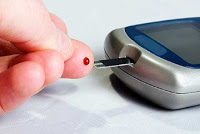We know that people with diabetes are at not at a higher risk of getting a COVID-19 infection, but are at a higher risk of more severe infection. I have often been asked by my patients whether the risk is different for people with type 1 diabetes vs type 2 diabetes. A new study from England is the first to address this question.
First, a reminder that type 1 diabetes is an autoimmune condition where the pancreas stops making insulin. This is the type of diabetes that we associate with onset in childhood or young adulthood, though it can come on much later in life as well. About 10% of people who have diabetes have type 1 diabetes. Type 2 diabetes occurs when the body is resistant to the effects of insulin, and the pancreas cannot make enough insulin to control blood sugars in the face of the insulin resistance. Overweight and obesity worsen insulin resistance; accordingly, about 90% of people who have type 2 diabetes have overweight or obesity. We typically think of type 2 diabetes as the type of diabetes that happens in older adulthood, but it can also happen in young adults and even kids. About 90% of people with diabetes have type 2 diabetes.
The COVID-19 study in England evaluated data from people registered with a general medical practice in England (over 61 million individuals). Amongst the 23,804 coronavirus-related in-hospital deaths recorded in this registry, one third occurred in people with diabetes. After adjusting for age, gender, socioeconomic status, ethinicity, geographical region, and past history of coronary artery disease, strokes, and heart failure, they found that people with type 1 diabetes had a 2.9 times greater risk of dying from COVID-19 than someone without diabetes, and people with type 2 diabetes had a 1.8 times higher risk of dying from COVID-19 than someone without diabetes.
(Note: the risk of in-hospital mortality for people with diabetes is increased under normal circumstances. In this British population, in non-COVID times, the risk of in-hospital death is 2.5 times higher in type 1 diabetes, and 1.5 times higher in type 2 diabetes – though not as high as what they found above for COVID-19 related deaths.)
The finding that people with type 1 diabetes seem to be at higher risk than those with type 2 diabetes is perhaps surprising, given that the chronic inflammatory state of metabolic syndrome and obesity (which would be present more often in people with type 2 diabetes than with type 1 diabetes) is thought to increase the risk of severe infection, as blogged previously. It could be that people with type 1 diabetes may be at higher risk of blood sugar fluctuations in hospital, may have had a longer duration of diabetes (which comes with a higher risk of diabetes related complications), or, it may be that there was an influence of other concomitant medical conditions which were not included in this analysis (see below).
It is of note that age was a far more important risk factor than diabetes in this study, with a 700-fold difference in risk between those under age 40 compared to those over age 80. People with diabetes under age 40 were at very low risk of death due to COVID-19 in this study.
In terms of limitations of this study, they were not able to include a history of chronic kidney disease or hypertension (high blood pressure) in their analysis due to incomplete data in the database. Both of these have been suggested to be risk factors for more severe COVID-19 disease, and both are commonly seen in people with diabetes, so either or both of these could partially mediate the higher risks seen. It is also of note that this paper has not yet completed the peer-review process for journal publication.
BOTTOM LINE: People with diabetes are at higher risk of severe COVID-19 infection, but younger people are still at a low absolute risk. This study suggests that there may be a higher risk for people with type 1 diabetes than type 2 diabetes, but more data needs to be collected in this area before we can draw definitive conclusions.
Subscribe to my blog (box top right) for more on COVID-19 in the coming weeks.
Share this blog post using your favorite social media link below!
Follow me on twitter! @drsuepedersen
www.drsue.ca © 2020












